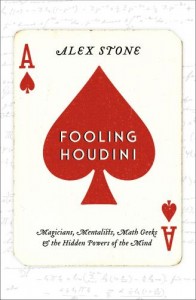Fooling Houdini Author Alex Stone Answers Your Questions
 Alex Stone, author of the excellent new book Fooling Houdini, was kind enough to take questions from blog readers – and there were some tough ones! Here are his answers:
Alex Stone, author of the excellent new book Fooling Houdini, was kind enough to take questions from blog readers – and there were some tough ones! Here are his answers:
Q. If you are a highly skilled — but evil — magician, and wanted to use your skills for financial gain through criminal means (or at least highly unethical means), what do you think would be the most profitable routes to take? –Derek
A. Wall Street.
Q. Why is it that magicians are almost all men. Why are there so very few women magicians? –Eric M. Jones
A. I don’t really know, but I think it’s high time for that to change.
Q. 1) What would you say are the most important fundamentals of magic? 2) When a trick has failed, what do you do? Morph into another trick, repeat, or just admit it didn’t work? –caleb b
A. 1) Psychology. Understanding how people see things and learning to anticipate their actions. 2) I usually try to find an out. Or just run away as fast as you can.
Q. I often hear that fooling children with magic is very hard to do. –Eric M. Jones
A. Surprisingly so, yes. I talk about this in Fooling Houdini. Part of it may have to do with the way children pay attention. As adults, we’re very good at focusing on one thing while ignoring subsidiary distractions. This is great for getting stuff done, but it also makes you susceptible to misdirection, because magicians are good at getting you to train the spotlight of your attention on one thing—the wrong thing—while doing something tricky in the shadows. Kids, on the other hand, tend to focus on more than one thing at a time—their attention is more diffuse—which may make them harder to fool. Moreover, kids are relatively free of assumptions and expectations about how the world works, and magic is all about turning your assumptions and expectations against you.
Q. Do you know if there have been any fMRI studies of brains as they watch magic tricks? I’m wondering what the neurological link is between self-deception, cognitive dissonance, and apprehension of magic tricks. –frankenduf
A. The group that studies magic at the Barrow Neurological Institute may have done some functional imaging work of this sort. Here’s the link to their website.
Q. I’m always fascinated to note the personal dynamics involved in a frequent self-experiment wherein I initially go to the most negative Amazon reviews of a book instead of starting with the most helpful. Often, these reviews exonerate the book with irrelevant criticism. Given the constraints of finite human existence, sometimes my interest in the book ends right there. For the time being, this book falls into the latter category with a seemingly devastating one star Amazon review that reprints Ricky Jay’s review of the book. Do you consider any of his criticism valid? –Roy
A. That guy’s a legend. It’s an honor even to be criticized by him.
Q. How long have people been doing magic? Who were the first magicians? What were the first magic tricks like? Where does the deck of cards come from, anyway?
Are publishers really like vampires that sleep for a thousand years and then wake up the week your book is due and eat your face? Do you think they will announce the Higgs boson on July 4? Moreover, am I the only one who thinks the Standard Model is a complete joke. –Adam
A. I’ve been doing magic since I was five. Magic itself is thousands of years old. Wow, you’re asking a lot of questions. Wait, I know who this is…is this Adam Kay? Why do you hate the Standard Model so much? What did it ever do to YOU!?
Q. In the show Arrested Development, the character Gob (a magician) is a snob about referring to things as “illusions” rather than “tricks”. Are there any sort of real life magician hang-ups like there, where the common term or description of something is scorned by insiders? –Gabe F
A. “Illusions, dad! You don’t have time for my illusions!” A lot of magicians do, in fact, take issue with the word “trick.” One well-known Vegas conjuror has been known to remark: “Dogs do tricks. I do pure magic.” I personally don’t have a problem with it.
Q. Do competitions like those hosted by FISM (incorrectly referred to as the Magic Olympics in the book) or the guest list of the FFFF convention provide an accurate ranking of magicians’ abilities, or are there better objective measures that can be used?
For example, what process would you use to validate statements like “Some say Wesley James is the greatest underground magician alive.” (Chapter 3) The Wesley James comment drew my attention in particular because the only video of him commercially available — The Man Who Knows Erdnase, Magic Makers, 2007 — was universally panned by magic critics for its lack of technical merit. –James
A. That’s actually not true. Magicians commonly refer to the World Championships of Magic as the Magic Olympics. Lance Burton, for one, regularly calls them that at his Vegas show. As far as Wes James is concerned, I’ve seen his work up close and he is a genuine master.

Comments